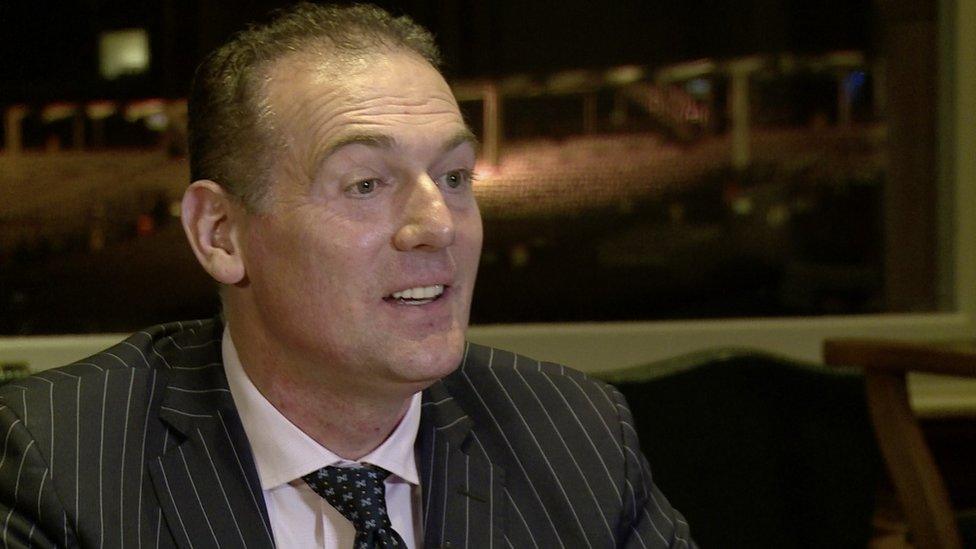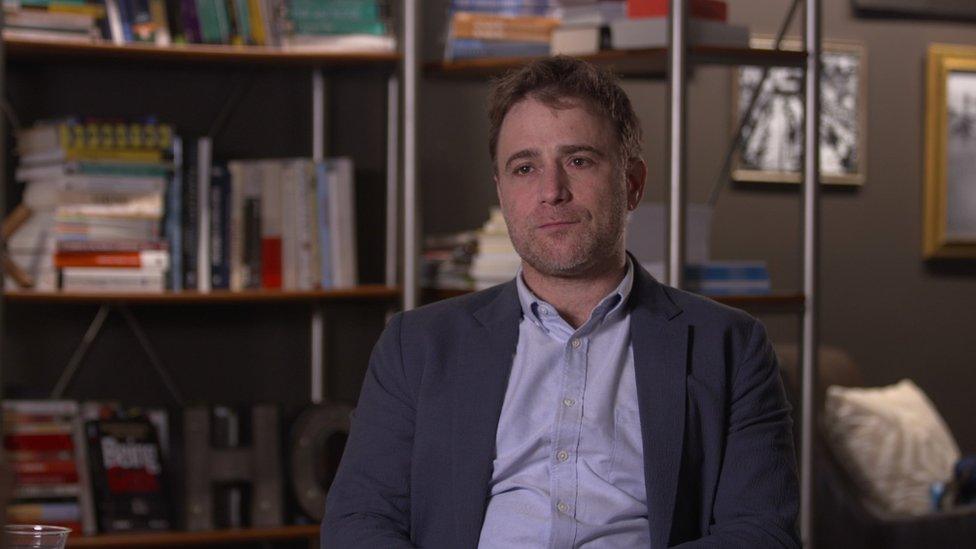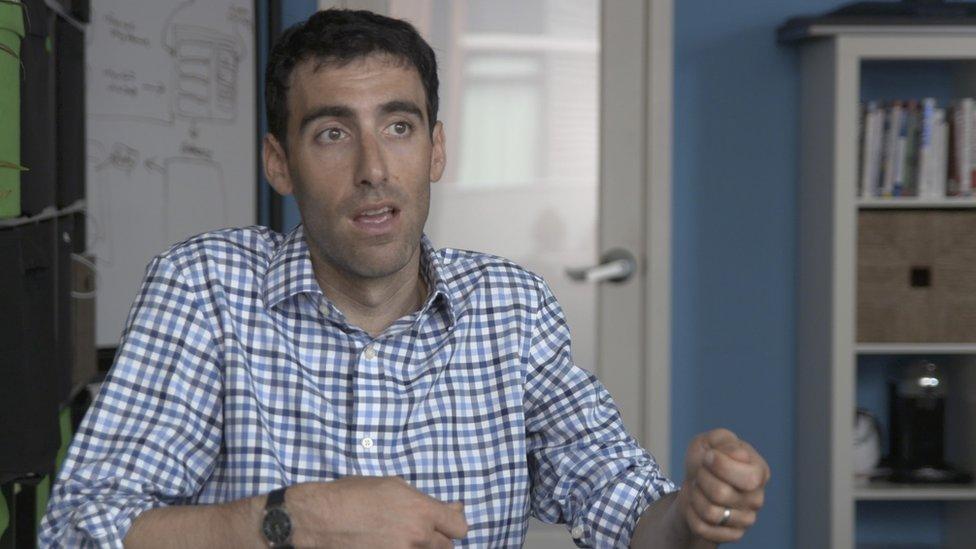The company bosses sleeping outside in midwinter
- Published
CEO coach and author Steve Tappin spent the night outside to raise money for charity
"Uncomfortable, a bit cold and not very nice," is how Andy Preston describes spending the night outside in just a sleeping bag in the middle of winter.
As founder and chair of charity CEO Sleepout UK, Mr Preston not only braved the chilly temperatures himself, but persuaded around 180 other company bosses, MPs and community leaders to join him.
The corporate sleepers included teams from Coca-Cola European Partners, Morgan Stanley, William Hill and Greene King.
The point of the night - this time held at Lord's Cricket Ground in London - was to raise money for homeless charities.
The charity holds similar events across the UK each year, urging company executives to get sponsored to "swap your briefcase for a sleeping bag for one night".
On this occasion the night raised £180,000, which as Mr Preston admits is "not huge" but can still "make the difference to people between being on the streets or being back in the system - holding down a job and paying tax".
Yet isn't it a bit, well, insensitive for highly paid executives to play at being homeless for a night?
Mr Preston, who started the charity in 2014, is adamant that they're "not pretending to be homeless", and says the aim of the experience is to show people some of the realities of not having a home.

CEO Sleepout UK founder Andy Preston says showing compassion should be part of a chief executive's role
"People give up a night of comfort, a night of luxury, they give up their time, they miss their family and friends.
"So there's a small sacrifice, it's uncomfortable, it's not very nice, but it raises awareness of an issue," he says.
He admits that the experience sometimes has no impact on an individual, but says that in some cases it can change someone's perspective on life.
"It's very easy for people who have the good fortune to make money, whether that's through pure skill and hard work or a bit of luck, it doesn't matter.
"I think that when that happens to someone they can become very detached."
Mr Preston himself used to work as a financial markets trader. He ran a number of trading businesses for international financial organisations, before later creating and managing a large hedge fund group for a European bank.
"I personally believe that if you have the good fortune to make some money or be influential, there should be more pressure on you to give more time or more money or raise more attention to help other people," he says.

CEO Sleepout UK urges executives to "swap your briefcase for a sleeping bag for one night"
For chief executives under pressure to deliver the latest quarterly result to shareholders, it's easy to imagine that charitable endeavours may take a back seat.
But Mr Preston is adamant that showing compassion should be part of a chief executive's role and one that shareholders should demand, arguing that "rolling up their sleeves and getting involved" is good for leadership and part of a firm's role within the wider community.
Reporting on their giving activity used to be a mandatory part of their annual report for publicly listed firms in the UK. However, in 2013 this became optional.
Since then, 13 of the UK's biggest firms have stopped reporting on their charitable activity, according to Charities Aid Foundation (CAF), which says the shift has been "disappointing".
"Given the size and influence these businesses have over the sector, it is concerning that, without knowledge of their contributions, they may no longer be able to set an example for the rest of the business sector in the UK," says Klara Kozlov, head of corporate clients at CAF
CAF's most recently available research, external shows charitable donations by the UK's 100 largest publicly listed firms fell 17% to £2.1bn in 2014, the lowest level since 2009, although this was in line with a similar drop in profit.
Yet the charity's research shows that the majority of companies that evaluate their corporate responsibility activities find it has a positive impact on their reputation, improves customer engagement and can help them attract new staff.

Tech start-up Slack was valued at $1bn just eight months after it launched
Aside from the evidence of the advantages philanthropy can provide, Stewart Butterfield, chief executive of the company behind workplace communications tool Slack, believes profitable firms have a duty to give money to charity.
The US start-up hit the headlines when it achieved a $1bn (£813m) valuation, external within eight months of its 2014 launch and is now valued at almost $4bn.
"Pretty much every employee here is in an incredibly fortunate position vis-a-vis the rest of the world in the amount of wealth that is created in this industry, and especially in markets like ours where it's incredibly fast-growing," he says.
Last year, the firm, which has offices around the world, raised enough money from staff and its founders to directly sponsor two Syrian families to move to Canada.
While he acknowledges the firm's main purpose is business, not charity, he says they are still part of a community and "would like the company to have a good impact as well".

Kaggle boss Anthony Goldbloom says governments should force firms to be charitable
However, Anthony Goldbloom, chief executive and founder of San Francisco-based Kaggle, a website which runs competitions for coding experts to solve problems, says in reality unless corporate social responsibility is made mandatory for firms, most won't make it a real focus.
"CEOs are going to do what they are judged on. I think that it's really the role of government to correct market failure and set a policy framework that means company incentives are in line with societal norms," he says.
But CEO coach and author Steve Tappin believes those at the top can help drive the change by acting as role models. "A more charitable approach doesn't just mean events or donations - it means changing attitudes," he says.
"The best CEOs know it's not just about giving money, it's about getting personally involved and that means connecting better with people and communities."
This feature is based on interviews by CEO coach and author Steve Tappin, and by series producer Neil Koenig, for the BBC's CEO Guru series.